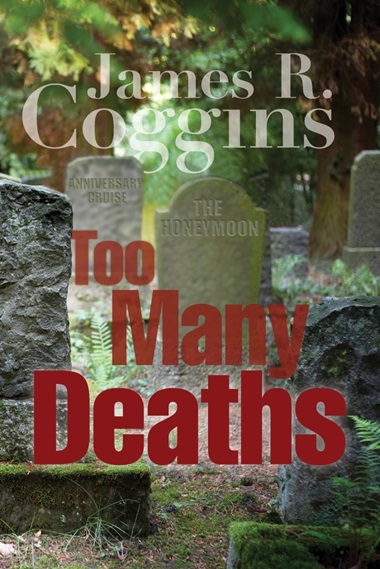 This is my second round-up of 2024, covering 11 newly published books from the local Christian community.
This is my second round-up of 2024, covering 11 newly published books from the local Christian community.
Again there is a range of topics. The write-ups are generally from Amazon and publisher / author sites.
I often begin with academic books (and there are several below) because we have so many fine educational institutions in the area.
But this time I’ll start with a new book by an old partner in crime, Jim Coggins. We worked together editing and publishing BC Christian News (thus our worst crimes were grammatical, not the type he has written about here).
Actually, Jim can’t afford to allow any grammatical crimes these days, because he launched Mill Lake Books a dozen years ago. It publishes primarily paperback books, including novels, biographies and Christian books.
Mill Lake Books was established to help writers, especially Canadian Christian writers, get their books published in an affordable way. It is named after Mill Lake Park in the centre of Abbotsford, which figured prominently in Coggins’s 2005 novel Mountaintop Drive (Moody Publishers).
Jim wrote on his Christians Read blog April 3:
It’s another case of the shoemaker’s children going barefoot. Over the last few years, through my Mill Lake Books imprint, I have published over 30 books. But rarely any of my own. I have continued to write, of course. Writers write because they can’t not write. If they don’t write, they will explode. Which would be messy.
But publishing is something else entirely. That is why, when one of my own books finally makes it into print, it is a noteworthy event. A rare gem. A long-anticipated achievement. A cause for celebration. A pleasant surprise. To me as well as others.
Therefore, I am more than pleased to announce the publication of Too Many Deaths.
- James R. Coggins: Too Many Deaths (Mill Lake Books)
Jim’s brief synopsis:
Looking over the scene of the grisly vehicle accident, Sergeant Troy Weston was certain of one thing – there had been too many deaths. . . .
Walter and Miranda were enjoying their honeymoon – until circumstances forced them to undertake a perilous journey through the mountains on horseback. . . .
John and Ruby Smyth were enjoying a cruise to celebrate their 25th wedding anniversary – until some of their fellow passengers began to go missing. . . .
Too Many Deaths offers three separate but loosely connected stories. It reunites diminutive Christian magazine editor John Smyth (the under-sung hero of four previous mystery novels) and Royal Canadian Mounted Police Sergeant Troy Wesson. The two (Smyth and Wesson) had collaborated to solve murders in an earlier Coggins novel, Desolation Highway. This is scarcely surprising since their namesake, Smith and Wesson, has been involved in many murders over the years.
- Gordon E. Carkner: Towards an Incarnational Spiritual Culture: Grounding Our Identity in Christ (Wipf and Stock)
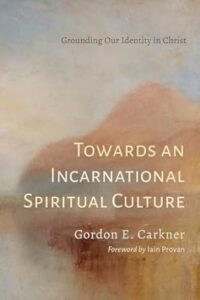 Rooted in the robust discourse of eminent Canadian philosopher Charles Taylor (A Secular Age), Towards an Incarnational Spiritual Culture takes the reader on a journey of deep reflection and discovery. Many things in today’s culture misdirect, seduce and confuse younger generations, when they actually need wise mentors with integrity.
Rooted in the robust discourse of eminent Canadian philosopher Charles Taylor (A Secular Age), Towards an Incarnational Spiritual Culture takes the reader on a journey of deep reflection and discovery. Many things in today’s culture misdirect, seduce and confuse younger generations, when they actually need wise mentors with integrity.
The discussion clarifies some of the core issues at stake in the late modern identity quest. In the process, it unpacks some of the most profound implications of the miraculous incarnation for personal flourishing.
The author introduces us to the power of dialogue with both divine and human interlocutors. We are brought around the table for mutual engagement, while receiving a compelling vision for life. The discussion is deeply embedded in a rich understanding of the Judeo-Christian Scriptures. The effect is to spark a lively faith-and-culture investigation.
The crucial question we are left with is this: Do we intend to be our own gods in some gnostic permutation – to invent ourselves from the ground up according to our own individual design? Or, should we investigate a relationship with God and agape love that can be life-transforming, freeing, and anchoring? Which direction will lead to a grounded, resilient identity?
Gordon Carkner is a meta-educator with postgraduate students and faculty at the University of British Columbia, promoting faith-and-culture dialogue and offering thought-provoking YouTube webinars. He and his wife Ute are both involved in ministry with Outreach Canada. He is chairperson of the prestigious lecture series, UBC Graduate and Faculty Christian Forum. He holds an MDiv from Trinity Evangelical Divinity School and a PhD in philosophical theology from University of Wales. He also wrote The Great Escape from Nihilism.
- Jens Zimmermann: Incarnational Humanism: A Philosophy of Culture for the Church in the World, 2nd edition (Regent College Publishing)
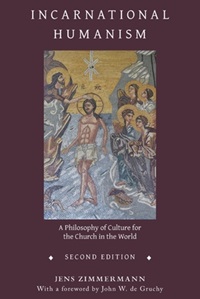 First published in 2012 by InterVarsity Press, Incarnational Humanism offers a theological understanding of what it means to be human. This understanding is rooted in the incarnation of Christ, the supreme expression of true humanity and true Godhood in one. From this centre, it charts a course for Christians to engage – and to transform – culture for the life of the world.
First published in 2012 by InterVarsity Press, Incarnational Humanism offers a theological understanding of what it means to be human. This understanding is rooted in the incarnation of Christ, the supreme expression of true humanity and true Godhood in one. From this centre, it charts a course for Christians to engage – and to transform – culture for the life of the world.
Zimmermann hosted a book launch at Regent College April 9, looking back on his experience of writing and revisiting Incarnational Humanism and reflecting on how his ideas have developed in the 12 years since the first edition was published.
He was joined by Hans Boersma (Order of St. Benedict Servants of Christ Chair in Ascetical Theology, Nashotah House Theological Seminary) for conversation on incarnational humanism’s relevance for our cultural moment. Go here for the video.
Jens Zimmermann is J.I. Packer Chair of Theology at Regent College. As a philosophical theologian, his main intellectual interests are philosophical anthropology (who we are) and epistemology (how we know). He has pursued these two questions across a broad range of interests, including theological anthropology, patristic and modern theology, theological and philosophical hermeneutics, European literature, Martin Heidegger, Hans-Georg Gadamer, Dietrich Bonhoeffer, and Hans Urs von Balthasar. He directs the Houston Centre for Humanity and the Common Good, which fosters interdisciplinary and interreligious dialogue on the central question of the late-modern world: what does it mean to be human?
- Loren Wilkinson: Circles and the Cross: Cosmos, Consciousness, Christ and the Human Place in Creation (Cascade Books)
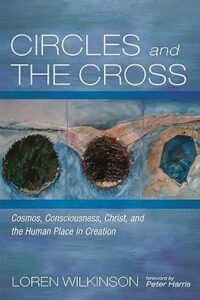 Circles and the Cross is an invitation to explore two mysteries. One is the miracle of the cosmos: why is there something and not nothing? The other is the miracle of consciousness: why should this collection of stardust be an I and not just an it? Our basic response to those mysteries is wonder, and from wonder have grown the three great trees of human culture: religion, art and science.
Circles and the Cross is an invitation to explore two mysteries. One is the miracle of the cosmos: why is there something and not nothing? The other is the miracle of consciousness: why should this collection of stardust be an I and not just an it? Our basic response to those mysteries is wonder, and from wonder have grown the three great trees of human culture: religion, art and science.
This exploration is undertaken in the light of a third mystery: the cross of Christ is the clearest picture we have of the triune Creator of both cosmos and consciousness. That self-emptying of the Creator out of love for the creation helps us understand the pleasures, paradoxes and pains of science; it helps us understand how ‘evolution’ can be another name for creation; it casts light on the Enlightenment and Romanticism.
In particular, it illuminates the environmental movement: an ethic in search of a religion. Loren Wilkinson, drawing on 50 years of teaching and writing about our relationship to creation, invites you to join this journey into understanding how the cross of Christ sheds light on the mysteries that surround us – and gives us hope in a difficult age.
Go here for the Preface of Circles and the Cross and here for an article leading up to his book launch at Regent College late last year.
Loren Wilkinson is professor emeritus of philosophy and interdisciplinary studies at Regent College. He has written many scholarly and popular articles developing a Christian environmental ethic and exploring the human relationship to the natural world in its environmental, aesthetic, scientific and religious dimensions. His books include Earthkeeping: Christian Stewardship of Natural Resources and Caring for Creation in Your Own Backyard (co-authored with Mary-Ruth Wilkinson). He and Mary-Ruth live on Galiano Island.
- Deborah Judas: Cultivating Shalom: Finding Peace in the Midst of Disruption, Uncertainty and Ordinary Life (WestBow Press)
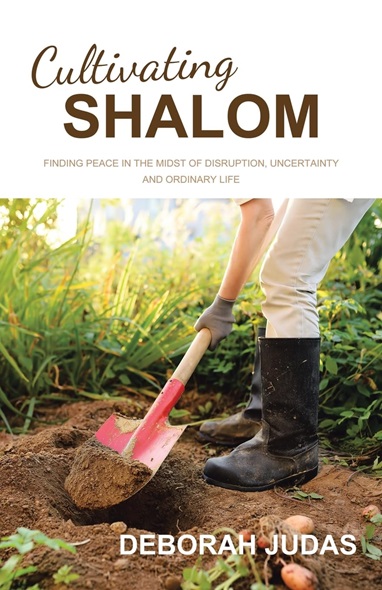 With all the noise and uncertainty, along with our fast paced world and jam-packed schedules, it is often difficult to keep sight of the goodness and beauty that surrounds us. Finding peace seems elusive when we are constantly bombarded with bad news, negativity and reminders that we don’t have enough.
With all the noise and uncertainty, along with our fast paced world and jam-packed schedules, it is often difficult to keep sight of the goodness and beauty that surrounds us. Finding peace seems elusive when we are constantly bombarded with bad news, negativity and reminders that we don’t have enough.
Is it possible to be content and fulfilled when there is a perpetual underlying sense that we don’t measure up? How can we contribute in positive ways to bring about healing, justice and hope to our world, even in the midst of disruption and disappointment?
The answers to these questions seem to lie in a familiar, ancient writing. Cultivating Shalom uses the imagery and wisdom of Psalm 23 to uncover new insights on what it means to flourish and experience wholeness, delight and wonder in all seasons of life.
This is not 10 easy steps to wellness. Rather, it is an invitation to keep company with God and others, providing a new lens that reveals the extraordinary power of ordinary life. Cultivating Shalom is down to earth and practical as it examines how paying attention to the small things and putting simple practices into place will cultivate the wonder of shalom in your own life.
Deborah Judas is a retreat facilitator and soul care practitioner who seeks to help people live holistically and lead from a robust and healthy spirituality. She is also a pastor at The Neighbourhood Church (where she delivered a sermon on Shalom and the Resurrection Easter Sunday), a leadership and wellness coach and Director of Formation with Forge Canada. She lives in Metro Vancouver with her husband Walt.
- Terry Glavin: St. Mary’s: The Legacy of an Indian Residential School (Longhouse Publishing)
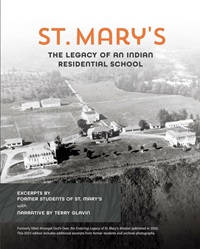 In the story of residential schools, “Catholics are victims too,” says author Terry Glavin.
In the story of residential schools, “Catholics are victims too,” says author Terry Glavin.
“The people who suffered in residential schools were Catholics.”
Glavin spoke those words during an interview about the republishing of his 2002 book St. Mary’s: The Legacy of an Indian Residential School, which recounts the history of the former St. Mary’s Residential School in Mission.
The current edition (St. Mary’s: The Legacy of an Indian Residential School) has been expanded with additional testimonies and photos and was funded through the Archdiocese of Vancouver’s Indigenous Reconciliation Fund. . . .
The book is about “one religious order and one residential school,” said Glavin. “I didn’t want the book to be a tribute to the school. I took great pains to present the gritty and nuanced experiences of the Aboriginal people.”
– excerpt from an article in The B.C. Catholic.
Terry Glavin is a journalist, author of seven books and co-author of three. Assignments in recent years have taken Glavin to Afghanistan, Israel, the Russian Far East, the Eastern Himalayas, Iraq, Syria, Turkey, Jordan, Geneva, China, Hong Kong, Taiwan and Central America. Among his writings dealing with Indigenous issues are Nemiah: The Unconquered Country and A Death Feast in Dimlahamid. He has won more than a dozen literary and journalism awards.
- Brian Bird & Derek Ross, General Editors: Rights, Freedoms and Their Limits: Reimagining Section 1 of the Charter (LexisNexis)
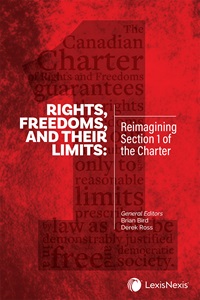 When can the state place limits on basic human rights? This is a fundamental question for any liberal democracy.
When can the state place limits on basic human rights? This is a fundamental question for any liberal democracy.
In Canada, for rights and freedoms guaranteed by the Canadian Charter of Rights and Freedoms, the answer is found in section 1 of this constitutional document. Section 1 provides that the state may only subject Charter rights and freedoms to limits that are “reasonable”, “prescribed by law” and “demonstrably justified in a free and democratic society.”
But interpreting these standards has proven a difficult task, one which courts, decision makers and legislatures have wrestled with over the first four decades of Charter jurisprudence.
Rights, Freedoms and Their Limits is a collection of papers developed out of the Supreme Court Law Review, Second Series. It offers fresh, innovative and insightful perspectives on these challenges, and on the proper scope, contours and limits of rights and freedoms. It will be of value to jurists, scholars, governments, lawyers, students and litigants alike.
A book launch was held at the Peter A. Allard School of Law at UBC February 16, featuring Geoff Plant OBC, KC. He currently provides public law and policy advice and representation and was the Attorney General of British Columbia and Minister Responsible for Treaty Negotiations from 2001 to 2005. In 2012 Mr. Plant was named one of Canada’s most influential lawyers by Canadian Lawyer Magazine.
Brian Bird is a Lecturer at the Allard School of Law. His research focuses on constitutional law, constitutional theory and human rights. He clerked for judges at the Supreme Court of BC and for Justice Andromache Karakatsanis at the Supreme Court of Canada. He completed his doctorate in law at McGill University, and holds a BCL from the University of Oxford, a JD from the University of Victoria and a BA from Simon Fraser University.
Derek Ross is Executive Director and General Counsel for Christian Legal Fellowship (CLF). He has appeared before all levels of court, including the Supreme Court of Canada, and has acted for public interest interveners in a number of cases involving the Canadian Charter of Rights and Freedoms. He is a centre associate with UBC’s Centre for Constitutional Law and Legal Studies and a former Vice Chair of the Ontario Bar Association’s Constitutional, Civil Liberties and Human Rights Section.
- Stephanie Gray Connors: My Body for You: A Pro-life Message for a Post-Roe World (Emmaus Road Publishing)
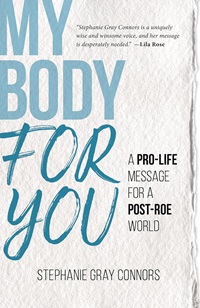 At a time when the slogan “My body, my choice!” is shouted louder than ever, the words of sacrificial love desperately need to be heard.
At a time when the slogan “My body, my choice!” is shouted louder than ever, the words of sacrificial love desperately need to be heard.
My Body for You by debater Stephanie Gray Connors inspires and equips readers to be bold in proclaiming the truth about life and our calling to give ourselves for others.
Diving specifically into common questions posed by abortion supporters, Connors urges all of us to reflect more deeply on who we are, what we are made for and why living out Christ’s words – “This is my body, given for you” – is the only path to victory for life.
Stephanie Gray Connors is an author and speaker who has presented on pro-life topics around the world. She has formally debated abortion advocates, including Princeton philosophy professor Peter Singer and late-term abortionist Dr. Fraser Fellows. She has lectured at Google headquarters for the series ‘Talks at Google’ and has written books on in vitro fertilization, abortion and assisted suicide.
- Fr. Lawrence Farley: Living Faith: An Orthodox Christian Conversation with Evangelicals (Ancient Faith Publishing)
- Fr. Lawrence Farley: The Mystical Psalter, Volume 1: Psalms 1 – 41 (independently published)
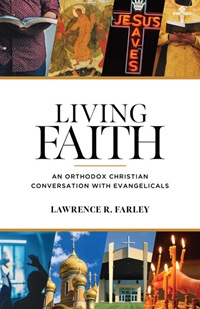 Much has been written about the similarities and differences between the Orthodox and Evangelical faiths. In Living Faith, Fr. Lawrence Farley provides a concise and non-confrontational summary of the major issues that divide the two.
Much has been written about the similarities and differences between the Orthodox and Evangelical faiths. In Living Faith, Fr. Lawrence Farley provides a concise and non-confrontational summary of the major issues that divide the two.
Evangelicals inquiring into Orthodoxy, Orthodox Christians who want to speak knowledgeably with evangelical friends and Orthodox Christians who simply wish to understand and appreciate their own tradition more fully will find this book useful and accessible.
Dive into the depths of the Psalms with The Mystical Psalter, Volume 1, where each verse unfolds the rich tapestry of prophecy, prayer and praise. Meticulously translated from the original Hebrew, this volume presents not only a fresh translation of the Psalter but also a verse-by-verse commentary that explains the psalms in terms of their original historical meaning and context and also mines the Christological significance hidden within these ancient hymns.
Fr. Lawrence Farley is the pastor of St. Herman of Alaska Orthodox Church (OCA) in Langley. He is also author of the Orthodox Bible Companion Series along with a number of other publications.
- Marja Bergen: In the Name of Jesus: Spiritual Support for Mental Health Challenges (Blurb)
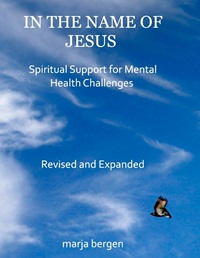 Medications, coping strategies and other world remedies cannot heal the ingrained wounds of stigma. The pain of rejection, shunning, exclusion, feelings of shame and being looked down on can only be relieved through spiritual means.
Medications, coping strategies and other world remedies cannot heal the ingrained wounds of stigma. The pain of rejection, shunning, exclusion, feelings of shame and being looked down on can only be relieved through spiritual means.
By following Jesus and how he treated those the world would not have anything to do with, we too can learn how to help those who are being stigmatized today. This revised version of In the Name of Jesus will help the reader understand what it’s like to live with the pain of stigma. They will see how knowing the love of Jesus and all he can be for us can bring relief and encourage a more confident life.
Marja Bergen lives with bipolar disorder but has managed to stay confident throughout most of her 76 years. Since 2006 she has been a pioneer in raising mental health awareness in the Christian church.
Go here for links to several earlier articles on local books.
